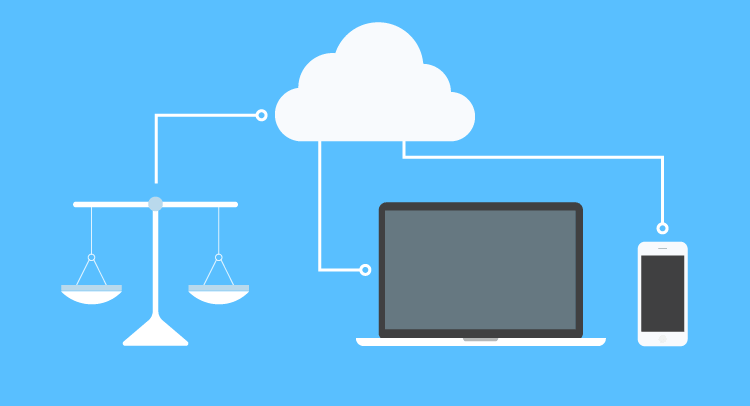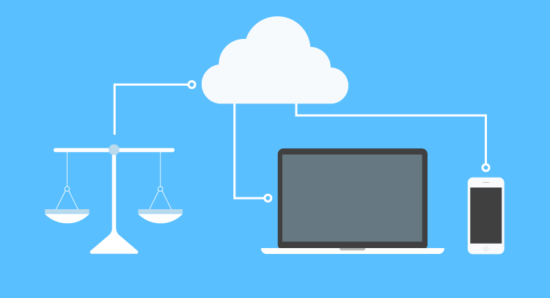The pandemic caused a seismic shift in the way we work—particularly for many law firms. Face-to-face client meetings were replaced by Zoom and Microsoft Teams calls, office chats happened on Slack instead of at the watercooler, and work took place at the kitchen table rather than the boardroom. What’s the common thread in all these scenarios? Pyjamas, yes, but also something far more significant: Cloud-based software. For many in the legal sector, the past two years have meant a move to some form of cloud-based law firm software.
Cloud technology enables people to access and share information online from any place at any time. As such, when Covid restrictions were introduced, law firms with cloud-based software were immediately able to continue with business as usual because staff could access systems from home.
Firms that had physical servers on their premises, on the other hand, had a much more challenging time making the transition to remote working. Many firms continued to work as much as they could from the office, fearing that they would lose access to important documents and workflows. Solicitors and law firms who used server-based, on-premise software experienced a layer of complexity when trying to keep the wheels turning for their law firm compared to those using legal technology.
Now, as more and more firms are adopting a hybrid working model (part office-based, part remote), having the accessibility and flexibility of cloud-based software is something that should be top of the agenda for all modern law firms.
However, despite this greater move to the cloud, many in the legal sector remain hesitant about moving away from a managed IT solution or switching from a server to a cloud-based solution. Concerns surrounding cloud security, data security, and adopting a new way of working feel overwhelming to many.
To address some of those concerns, let’s take a closer look at cloud computing for lawyers and how it fares against more traditional office-based solutions.
Cloud Computing for Lawyers: The Lowdown
How exactly does cloud computing work for law firms? Let’s look at an example. Anne is a legal secretary at a small law firm in Cardiff. She spends her days preparing and filing legal documents, managing correspondence with clients, time tracking, the list goes on.
If Anne’s firm was using an on-premise server, she’d most likely work on software that’s been installed on her computer locally (i.e. she would only be able to work for a particular computer in her office). She may also have to physically scan and save signed documents to folders on a hard/shared drive—or file them in a filing cabinet. Essentially, all of the work Anne does is tied to a system that exists in the physical office.
Cloud-based practice management software for law firms works in a completely different way. Instead of tying users down to the office, they can access systems through a web browser or a dedicated app. Nothing is stored on local computers or hard drives.
To keep with our example, that means, if Anne was in court and realised that she needed a client document urgently, she could access it through her laptop or phone as long as she had an internet connection. Because all information is stored in the cloud, data can be accessed anywhere.
Data Security: Is Cloud-Based Legal Software Secure?

Storing sensitive information in the cloud is a common concern for solicitors. However, cloud-based software is often considered more secure than traditional data centres. In fact, in its “Cybersecurity for solicitors” guide, the Law Society of England and Wales states that “small to medium-sized firms in particular may benefit from using cloud computing services.”
In recent years, significant investment has been made by cloud-based software providers into cybersecurity. As a result, systems are constantly being monitored for potential vulnerabilities, while code is reviewed and updated accordingly to ensure that software is always up to date.
Cloud-based software providers also have teams of IT professionals on hand to support clients, and firms can restrict or grant access to certain information to staff members as necessary. The access-anywhere nature of cloud-based software means that advanced security features are necessary to ensure that any suspicious activity is monitored—for example, with Clio, every IP address is logged, and multi-factor authentication helps keep systems safe. (You can read more about Clio’s security features here.)
You may like these posts
On-premise Versus Cloud-based Law Firm Software: Pros and Cons
While on-premise technology gives businesses the power to mould their systems to their own specifications, there are a number of challenges that arise with traditional data centres.
Uptime
As on-premise servers are in a physical location, uptime can be inconsistent and at risk of damage by flooding, power outages, and fire.
Cloud-based software generally offers a guaranteed uptime of over 99% (with Clio it’s 99.9%!).
Total Cost of Ownership
The overall cost of on-premise technology adds up—the servers themselves, office floor space, electricity, IT support, and maintenance. If customisation or upgrades are needed over time, firms will need to assign further budgets, making it a significantly larger investment than cloud technology.
Cloud-based software doesn’t require any of the costs associated with having a physical server. For many cloud-based softwares, subscription fees are paid monthly or annually, typically on a per-user basis, and upgrades/new features are often free of charge.
On balance, when it comes to budgeting, there can often be a strong cost-benefit to cloud-based systems for law firms of all sizes, but especially when using a cloud server as a small law firm who might otherwise not have room in the budget for IT support.
Support
Speaking of support: As on-premise technology can be bespoke, support is managed by a team of IT professionals that have been hired/outsourced by a firm. This means that if IT staff leave the business, it will impact the resources required to fix bugs and server issues, roll out updates, not to mention the time it takes to train new staff.
With cloud-based practice management software for law firms, there is often a standard level of IT support offered (sometimes free of charge or at a cost—always be sure to check costs with potential providers). With Clio, self-serve resources are available (videos, articles, etc.) to help users to solve minor issues themselves. Access to assistance isn’t impacted by an IT headcount in the firm, and support is offered around the clock through live chat, phone, and email.
Cybersecurity best practice in the cloud
The most effective way for law firms to ensure that their business is safeguarded is by pairing top-class technology with cybersecurity best practices.
Firms must comply with GDPR requirements to ensure that individual clients control access to their personal information. Client confidentiality must be at the core of every business and this requires every staff member to weave set procedures and policies into their day-to-day tasks. Clients should also be aware of a firm’s methods of communication so they can spot any possible red flags, while staff members should receive annual cybersecurity training.
It’s also important for firms to perform regular security assessments to identify any potential risks and devise an action plan to have ready in the unlikely event of a data breach.
Consider making security assessments and cybersecurity metrics part of your law firm’s KPIs
Considering Cloud-based Law Firm Software? How to Choose the Right Technology Provider
With multiple case management software options on the market, it can be difficult to know what the best fit is for your firm. Here are some key questions to ask providers offering cloud services when choosing cloud-based software:
- What are your terms of service/confidentiality policies?
Ask providers about their uptime guarantees, storage limits, and contractual obligations when subscribing to their service. - What is your back-up/business continuity plan?
Find out how data is backed up/protected, and how providers manage any unexpected events (such as natural disasters or significant human error).
- What security measures are provided as standard?
Ask for an in-depth explanation of the security features offered by providers—for example, how is unauthorised access prevented? Is there data encryption in place? How often do security audits take place? What support is offered if a data breach occurs? - What is your geo-location?
If a provider has multiple server and storage locations, find out where they are, how often they are synced, and that all data residency requirements are being adhered to. - What happens if we cancel our subscription?
Determine what will happen to your monthly/annual payments if you cancel your contract and how all of your data will be treated by the provider in such an event (i.e. returned to you or permanently deleted). - How is data migrated from one system to another?
Get a full understanding of how all of your data can be transferred from your existing systems (be that an on-premise server, existing cloud-based software, or a legal managed services provider) to your new software.
Conclusion
All law firms should have two key objectives—maintaining the highest level of client confidentiality, and ensuring the smooth and efficient running of their business. Cloud-based technology delivers on both fronts. While no one expected the profound impact that the pandemic would have on how we work, the move to cloud-based law firm software was a rare silver lining for many law firms the world over.
The world continues to move to a more digital space, and law firms are included in that. If futureproofing your business for circumstances that can’t be predicted is important to you, it’s time to consider making the switch to the cloud.
We published this blog post in March 2022. Last updated: .
Categorized in: Business, Technology







